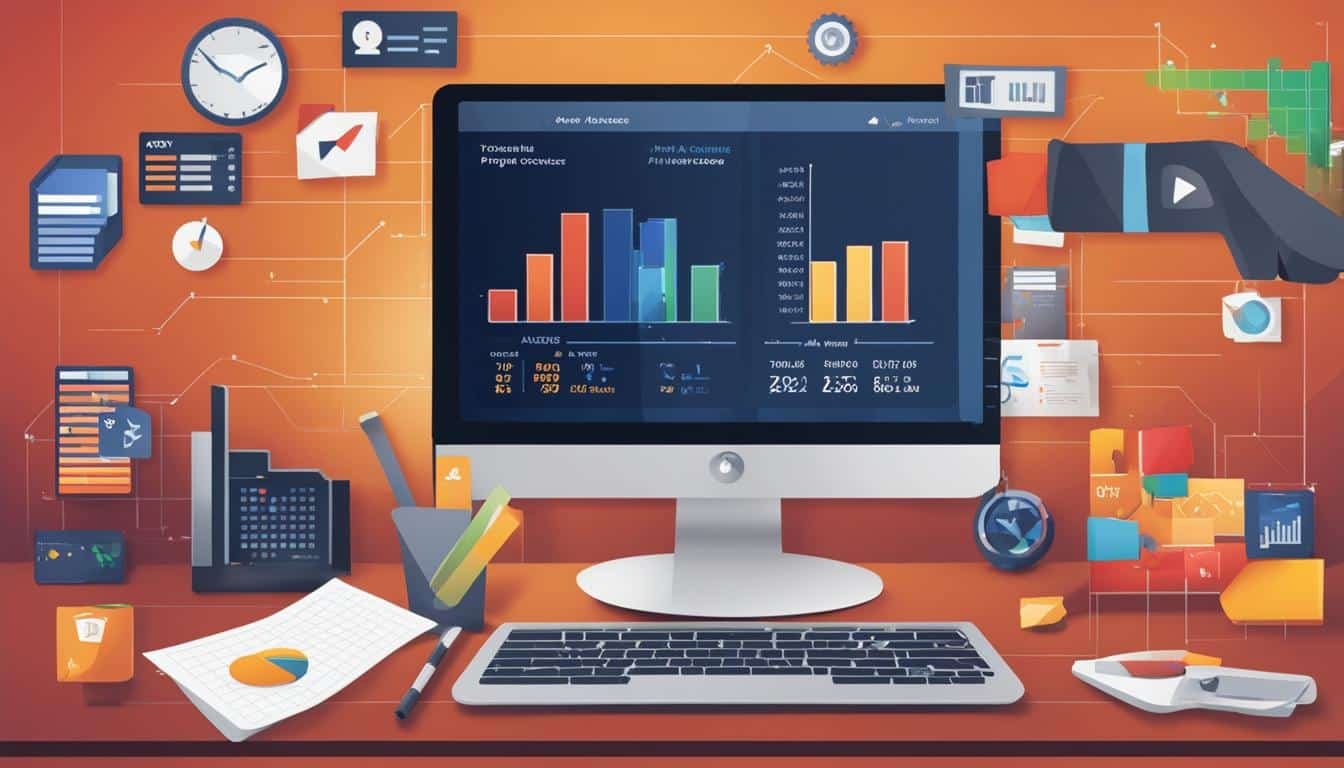Are you aspiring to become a certified public accountant (CPA) and looking for the best way to prepare for the CPA exam? Look no further! Our comprehensive online CPA course is designed to help you master your exam and achieve your goal of becoming a CPA. With expert-led instruction and easy-to-follow materials, our course offers everything you need to succeed. Start your journey towards CPA success today!
Also Read: Letting Life’s Challenges Run Its Course: Gain Perspective
At our online CPA course, we understand the importance of thorough preparation for the CPA exam. Our course provides you with the knowledge and skills necessary to confidently tackle the exam and excel in your career as a certified public accountant. Whether you are a working professional or a student, our flexible online platform allows you to study at your own pace and convenience. With our course, you can be confident that you are receiving the best CPA review available.
Key Takeaways:
- Our online CPA course offers comprehensive preparation for the CPA exam.
- Expert-led instruction and easy-to-follow materials ensure your success.
- Flexible online learning platform allows you to study at your own pace.
- Prepare to master your exam and become a certified public accountant.
- Start your journey towards CPA success today!
How to Get Your CPA License: 4 Steps to Success
Becoming a certified public accountant (CPA) is a rewarding career path that requires dedication and hard work. To help you navigate the process, we’ve outlined the four essential steps to getting your CPA license. Whether you’re just starting your journey or already a CPA candidate, following these steps will set you on the path to success.
Step 1: Verify Your State’s CPA Licensing Requirements
Before you begin the process of becoming a CPA, it’s crucial to understand and verify your state’s specific CPA licensing requirements. Each state has its own board of accountancy that sets the criteria for CPA licensure. These requirements can vary, and it’s essential to research and ensure that you meet all the necessary qualifications. Key considerations may include residency requirements, specific semester hours in accounting, and other related factors. Checking with your state’s board of accountancy will help ensure that you’re on the right track.
Also Read: Discover Fresh Pond Golf Course: A Premier Golf Experience
Step 2: Complete Your Degree and Gain Experience
Once you’ve verified your state’s CPA licensing requirements, the next step is to complete the educational requirements and gain the necessary experience. Most states require a minimum of 150 credit hours, which can be achieved through a combination of undergraduate and graduate coursework. Some jurisdictions also have additional experience requirements, which typically involve working under a licensed CPA for a designated period. Fulfilling these educational and experiential requirements is vital to becoming eligible to sit for the CPA exam.
Step 3: Pass the CPA Exam
The CPA exam is a challenging but necessary step towards becoming a certified public accountant. The exam consists of four sections: Auditing and Attestation (AUD), Business Environment and Concepts (BEC), Financial Accounting and Reporting (FAR), and Regulation (REG). To prepare for the exam, there are various options available, including self-study materials, online courses, and in-person review sessions. It’s important to choose the preparation option that aligns with your learning style and schedule. With dedicated study and practice, passing the CPA exam is achievable.
Step 4: Finalize Your Certification
After successfully completing the CPA exam, there may be additional steps required to finalize your certification, depending on the state. For example, some states mandate an ethics exam or participation in continuing professional education (CPE) to maintain your CPA license. It’s crucial to be aware of and fulfill these specific requirements to ensure that your certification is complete and up-to-date.
Also Read:-Discover Fresh Pond Golf Course: A Premier Golf Experience
By following these four steps, you’ll be well on your way to obtaining your CPA license and pursuing a successful career as a certified public accountant. Remember to stay organized, stay motivated, and seek guidance from professionals and resources along the way. Good luck on your journey!
Also Read: Creating Fun With A Chalk Obstacle Course: A Guide
Verify Your State’s CPA Licensing Requirements
The first step in the process of becoming a CPA is to verify your state’s CPA licensing requirements. Each state has its own board of accountancy that sets the requirements for CPA licensure. These requirements can vary and may include residency requirements, specific semester hours in accounting, and more. It’s important to check with your state’s board of accountancy to ensure you meet the necessary qualifications.
Here is an overview of the key factors to consider when verifying your state’s CPA licensing requirements:
- Residency Requirements: Some states require candidates to be residents in order to obtain a CPA license. This may involve living in the state for a certain period of time or having a permanent address within the state.
- Semester Hours in Accounting: Most states have specific educational requirements, including a minimum number of semester hours in accounting. These courses typically cover topics such as financial accounting, auditing, taxation, and managerial accounting.
- Additional Coursework: In addition to accounting courses, some states may require candidates to complete courses in related subjects such as business law, economics, and finance.
- Ethics Requirements: Many states have ethics requirements that candidates must fulfill. This may involve completing an ethics course or passing an ethics exam.
By understanding and verifying your state’s CPA licensing requirements, you can ensure that you meet the necessary qualifications and are on the right path towards becoming a certified public accountant.
| State | Residency Requirement | Semester Hours in Accounting | Additional Coursework | Ethics Requirement |
|---|---|---|---|---|
| California | Yes | 24 | Yes | Yes |
| Texas | No | 30 | No | Yes |
| New York | Yes | 33 | Yes | No |
| Florida | Yes | 36 | Yes | No |
Table: Overview of CPA Licensing Requirements in Select States
Keep in mind that the information provided in the table above is just a snapshot of the requirements in a few states. It’s important to research and verify the specific requirements in your state to ensure you’re on the right track towards becoming a CPA.
Complete Your Degree and Gain Experience
Once you’ve verified your state’s CPA licensing requirements, you’ll need to complete the educational requirements specified by your state. Most states require a minimum of 150 credit hours, which can be completed through a combination of undergraduate and graduate coursework. It’s important to note that these credit hours should include a specific number of accounting-related courses to meet the CPA educational requirements.
Also Read: Mastering The Squirrel Obstacle Course: A Fun Guide
In addition to fulfilling the credit hour requirement, some states may have additional experience requirements that mandate working under a licensed CPA for a certain period of time. This experience allows aspiring CPAs to gain practical knowledge in the field and apply their theoretical learning to real-world scenarios. Working under a licensed CPA provides valuable mentorship and guidance that can enhance your understanding of the industry and prepare you for the challenges of the CPA profession.
To meet the experience requirements, you can seek employment opportunities in accounting firms, corporations, or government agencies where you can work under the supervision of a licensed CPA. This experience will not only help you meet the requirements for licensure but also provide you with valuable insights and practical skills that will benefit you throughout your career as a CPA.
Table: Comparison of CPA Educational and Experience Requirements by State
| State | Credit Hour Requirement | Experience Requirement |
|---|---|---|
| State A | 150 credit hours with 30 hours in accounting | 2 years of experience under a licensed CPA |
| State B | 120 credit hours with 24 hours in accounting | 3 years of experience in public accounting |
| State C | 180 credit hours with 36 hours in accounting | 1 year of experience in government accounting |
“Completing the educational requirements and gaining relevant experience are crucial steps in your journey to becoming a CPA. These requirements ensure that aspiring CPAs have a strong foundation in accounting principles and practical skills necessary for the profession. By investing time and effort into your education and gaining experience under the guidance of a licensed CPA, you’ll be well-prepared to tackle the challenges of the CPA exam and excel in your career.”
Pass the CPA Exam
The CPA exam consists of four sections that test your knowledge of accounting standards, legal requirements, and more. These sections include:
- Auditing and Attestation (AUD)
- Business Environment and Concepts (BEC)
- Financial Accounting and Reporting (FAR)
- Regulation (REG)
To prepare for the CPA exam, there are various options available, including:
- Self-study materials
- Live webinars
- In-person review sessions
It’s important to choose the CPA preparation option that works best for your study habits and schedule.
Also Read: Experience Excellence At West Hill Golf Course – A Golfer’s Paradise
| CPA Exam Section | Content |
|---|---|
| Auditing and Attestation (AUD) | Knowledge and understanding of the auditing process, attestation engagements, and professional standards. |
| Business Environment and Concepts (BEC) | Knowledge and understanding of business concepts and the economic, regulatory, and technological environments in which businesses operate. |
| Financial Accounting and Reporting (FAR) | Knowledge and understanding of generally accepted accounting principles for business enterprises, not-for-profit organizations, and governmental entities. |
| Regulation (REG) | Knowledge and understanding of federal taxation, business law, and ethics. |
By studying and preparing for each section, you’ll be well-equipped to pass the CPA exam and move closer to achieving your goal of becoming a certified public accountant.

“Success is not the key to happiness. Happiness is the key to success. If you love what you are doing, you will be successful.” – Albert Schweitzer
Finalize Your Certification
Once you have passed the CPA exam, your journey towards becoming a certified public accountant is not yet complete. There may be additional steps required to finalize your certification, depending on the requirements of your state. These steps typically include an ethics exam and participation in continuing professional education (CPE) programs to maintain your CPA license.
The ethics exam is designed to ensure that CPAs adhere to the highest standards of professional conduct and ethics. It tests your knowledge and understanding of ethical standards and regulations that govern the accounting profession. By successfully completing the ethics exam, you demonstrate your commitment to upholding the integrity and trustworthiness expected of a CPA.
In addition to the ethics exam, most states also require CPAs to participate in continuing professional education (CPE) programs on an ongoing basis. These programs help CPAs stay informed about changes in accounting standards, laws, and regulations. They also provide opportunities for professional development and skill enhancement. CPAs are typically required to complete a certain number of CPE credits every year or every reporting period to maintain their certification.
| Steps to Finalize Your Certification | Requirements |
|---|---|
| 1. Ethics Exam | Passing score on the ethics exam |
| 2. Continuing Professional Education (CPE) | Completion of a certain number of CPE credits every reporting period |
By completing these final steps, you can finalize your certification as a CPA and gain the authority to practice accounting professionally. It’s important to stay updated on the specific requirements of your state and fulfill your obligations to maintain your CPA license.

How Long Does It Take to Become a CPA?
Many factors influence the time it takes to become a Certified Public Accountant (CPA). The process typically involves meeting educational requirements, gaining experience, passing the CPA exam, and fulfilling licensing requirements. The timeline can vary based on individual circumstances and the specific requirements of each state.
To give you a general idea, it can take around 7 years to become a CPA. This includes completing the necessary educational requirements, which usually involve earning a minimum of 150 credit hours. These credit hours can be obtained through a combination of undergraduate and graduate coursework in accounting and related subjects.
Once the educational requirements are met, aspiring CPAs need to gain experience. Some states have additional experience requirements that mandate working under a licensed CPA for a certain period of time. The duration of this experience can vary, but it typically ranges from 1 to 2 years.
After fulfilling the educational and experience requirements, candidates must pass the CPA exam. The exam consists of four sections: Auditing and Attestation (AUD), Business Environment and Concepts (BEC), Financial Accounting and Reporting (FAR), and Regulation (REG). The exam preparation process can take several months, depending on the study habits and dedication of the individual.
The CPA Exam Timeline
| Step | Timeline |
|---|---|
| Verify State Requirements | 1-2 weeks |
| Complete Educational Requirements | 4-5 years |
| Gain Experience | 1-2 years |
| Prepare for and Pass the CPA Exam | 2-6 months |
| Fulfill Licensing Requirements | Varies by state |
It’s important to note that the timeline provided is just an estimate and can vary depending on individual circumstances. Factors such as the candidate’s dedication, availability to study, and the specific requirements of each state can impact the overall duration of the process. Additionally, unforeseen circumstances or delays in application processing can also affect the timeline.
Before embarking on the journey to become a CPA, it’s crucial to research and understand the exam eligibility requirements and licensing requirements of your state. This will help you plan and manage your time effectively, ensuring a smooth and successful path to achieving your CPA license.

How to Become a CPA Without a Degree in Accounting
While a degree in accounting is a traditional pathway to becoming a Certified Public Accountant (CPA), it is possible to pursue a nontraditional path to accountancy. Many jurisdictions allow individuals without an accounting degree to become CPAs by fulfilling specific education requirements and earning additional credit hours.
If you are interested in becoming a CPA without an accounting degree, it is essential to research and understand the education requirements set by your state. Most states require a certain number of credit hours in accounting, typically around 24 semester hours. These credit hours can be obtained through undergraduate coursework or additional credits earned after completing a degree in a different field.
By completing the required credit hours in accounting, you can demonstrate your knowledge and competency in the subject matter. This alternative pathway allows individuals with diverse educational backgrounds to pursue a career in accountancy and become eligible to sit for the CPA exam.
It’s important to note that while you can become a CPA without an accounting degree, the education requirements may vary by state. Be sure to check with the appropriate licensing authority to ensure you meet all the necessary qualifications.

Table: Education Requirements for Becoming a CPA Without an Accounting Degree
| State | Required Accounting Credit Hours |
|---|---|
| New York | 33 semester hours |
| California | 24 semester hours |
| Texas | 30 semester hours |
| Florida | 36 semester hours |
Table: Education requirements for becoming a CPA without an accounting degree in selected states. The number of required accounting credit hours may vary by state.
Can I Become a CPA Online?
Yes, you can become a CPA online. Many online CPA prep courses and training programs are available to help you prepare for the exam. These online courses offer flexibility and convenience, allowing you to study at your own pace and from the comfort of your own home. Whether you prefer self-study materials or interactive online classes, there are various options available to fit your learning style and needs.
Online CPA prep courses provide comprehensive study materials and resources that cover all the necessary topics for the CPA exam. You’ll have access to practice questions, mock exams, and instructional videos to help you understand and review the material. These courses are designed by experienced CPAs and educators who understand the exam content and structure, ensuring you receive the best preparation possible.
Virtual CPA training allows you to interact with instructors and fellow students through online forums, discussion boards, and live webinars. This creates a collaborative learning environment where you can ask questions, clarify concepts, and engage in meaningful discussions. The flexibility of online learning also allows you to balance your study schedule with other commitments, making it easier to fit your CPA preparation into your busy life.

By choosing online CPA prep courses, you can take advantage of the latest technology and learning platforms to enhance your study experience. These courses often include interactive tools and resources such as virtual simulations, flashcards, and progress tracking features. This not only makes the learning process more engaging but also helps you track your progress and identify areas where you need more focus.
Conclusion
Our online CPA course is the key to unlocking your success in the accounting industry. With our comprehensive materials and expert-led instruction, you’ll be well-prepared to conquer the CPA exam and obtain your license. Whether you’re aiming to enhance your career prospects or start a new chapter in accounting, our course is designed to meet your needs.
By enrolling in our online CPA course, you’ll have the flexibility to learn at your own pace and from the comfort of your own home. Our user-friendly platform makes it easy to access the course materials and track your progress. We understand that life can be busy, so we’ve designed our course to fit seamlessly into your schedule.
Don’t let the CPA exam intimidate you – our online course will equip you with the knowledge and confidence to conquer it. Join our community of aspiring CPAs and take the first step towards a thriving career in accounting. Enroll today and get ready to ace the exam, get your CPA license, and open doors to exciting opportunities in the field.
FAQs
Q: Can I become a CPA without a degree in accounting?
A: Yes, it is possible to become a CPA without a degree in accounting. Many jurisdictions require a certain number of credit hours in accounting, typically around 24 semester hours. These credit hours can be obtained through undergraduate coursework or 2023 additional credits earned after completing a degree in a different field. It’s important to meet the specific education requirements set by your state to become eligible to sit for the CPA exam.
Q: How long does it take to become a CPA?
A: The time it takes to become a CPA can vary depending on individual circumstances and the specific requirements of your state. In general, it can take around 7 years to become a CPA. This includes fulfilling the educational and experience requirements, preparing for and passing the CPA exam, and finalizing your certification. It’s important to check the exam eligibility requirements and licensing requirements in your state to understand the timeline for becoming a CPA.
Q: How can I verify my state’s CPA licensing requirements?
A: The first step in the process of becoming a CPA is to verify your state’s CPA licensing requirements. Each state has its own board of accountancy that sets the requirements for CPA licensure. These requirements can vary and may include residency requirements, specific semester hours in accounting, and more. It’s important to check with your state’s board of accountancy to ensure you meet the necessary qualifications.
Q: What are the steps to getting my CPA license?
A: The four steps to getting your CPA license include: verifying your state’s CPA licensing requirements, completing your degree and gaining experience, passing the CPA exam, and finalizing your certification. Each state has different requirements, so it’s important to research and understand the specific requirements in your state.
Q: How can I pass the CPA exam?
A: The CPA exam consists of four sections that test your knowledge of accounting standards, legal requirements, and more. The sections include Auditing and Attestation (AUD), Business Environment and Concepts (BEC), Financial Accounting and Reporting (FAR), and Regulation (REG). To prepare for the exam, there are various options available, including self-study, live webinars, and in-person review sessions. It’s important to choose the CPA preparation option that works best for your study habits and schedule.
Q: Do I need to do anything else after passing the CPA exam?
A: Passing the CPA exam doesn’t automatically grant you a license to practice as a CPA. Some states may require additional steps, such as an ethics exam or participation in continuing professional education (CPE) to maintain your certification. It’s important to understand the specific requirements in your state to ensure you fulfill all necessary obligations to finalize your certification.
Q: Can I become a CPA online?
A: Yes, you can become a CPA online. Many online CPA prep courses and training programs are available to help you prepare for the exam. These online courses offer flexibility and convenience, allowing you to study at your own pace and from the comfort of your own home. Whether you prefer self-study materials or interactive online classes, there are various options available to fit your learning style and needs.
Q: What is the CPA exam?
A: The CPA exam is a rigorous and comprehensive assessment that individuals must pass in order to become a certified public accountant (CPA) in the United States.
Q: How can I prepare for the CPA exam?
A: You can prepare for the CPA exam by enrolling in an online CPA course that covers essential topics such as financial accounting, taxation, audit, and more. Our course can help you master the exam content and be well-prepared for success.
Q: What are the benefits of obtaining a CPA certification?
A: Obtaining a CPA certification can significantly enhance your career prospects in the field of accounting. It demonstrates your expertise and commitment to ethical and professional standards.
Q: What are the key components of the CPA exam?
A: The CPA exam consists of four sections: Auditing and Attestation (AUD), Business Environment and Concepts (BEC), Financial Accounting and Reporting (FAR), and Regulation (REG).
Q: Is a bachelor’s degree required to take the CPA exam?
A: Yes, a bachelor’s degree is one of the key requirements for taking the CPA exam. Additionally, the coursework should include specific business and accounting-related courses.
Q: When are the 2024 CPA exam dates?
A: The 2024 CPA exam dates are typically determined by the respective state boards of accountancy. It’s important to check with the specific board for the exam schedule.
Q: How can I ensure success in the CPA exam?
A: To ensure success in the CPA exam, it’s essential to thoroughly prepare for each section, understand key accounting principles, practice exam-style questions, and seek support from reputable CPA review courses.
Q: What career opportunities are available with a CPA certification?
A: With a CPA certification, you can pursue various career paths such as financial accounting, taxation, forensic accounting, audit, financial management, and more. It opens doors to rewarding opportunities in the accounting field.
Q: What are the requirements for obtaining a CPA certification?
A: The requirements for obtaining a CPA certification typically include completing educational requirements, passing the CPA exam, and fulfilling any additional state-specific requirements such as work experience.
Q: How can an online CPA course help in preparing for the CPA exam?
A: An online CPA course can provide comprehensive study materials, practice questions, expert guidance, and flexibility for busy professionals to effectively prepare for the CPA exam and achieve success.




